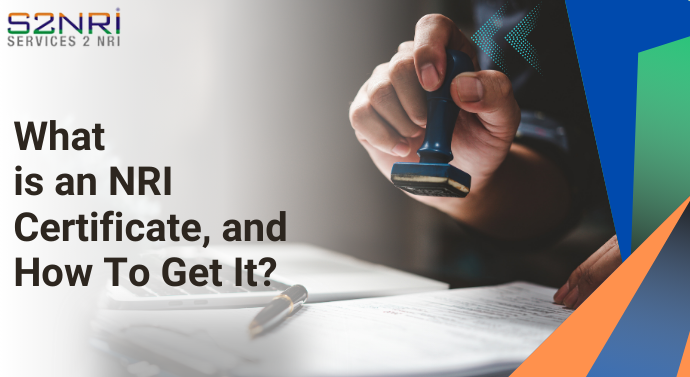An NRI (non-resident of India) certificate is documented proof of an individual who lives overseas or outside India for employment, business, or other purposes. This proof proves that the bearer is an NRI; he or she can use it for various legal, financial, and administrative purposes. For example, NRIs would require it to open NRI bank accounts, file for exemptions in taxes, buy or sell property, or avail themselves of specific government schemes.
Importance of an NRI Certificate
For any Indian who is required to prove his/her citizenship, the NRI certificate can make it a smooth journey. The Indian government and other institutions may request to present it for the following purposes:
- Banking Needs: To open NRO (Non-Resident External) or NRO (Non-Resident Ordinary) bank accounts.
- Tax Benefits: To leverage income tax exemptions provided under the Income Tax Act.
- Property Transactions: To buy or sell immovable property in India.
- Educational Admissions: To enable children of NRIs to secure seats in a school under the NRI quota in Indian educational institutions.
- Visa and Legal Matters: To assist in visa renewals, loan applications, or legal proceedings in India.
Obtaining an NRI Certificate
Obtaining an NRI certificate is potentially daunting if you have no idea about its steps. These steps include supporting papers, application submission, and verification of your credentials. Now that you are interested, let’s introduce you to a series of steps:
1. Eligibility Criteria
Before going further, discover if you are eligible for this certificate. This eligibility can be determined by the fact that:
- You’re an Indian citizen living outside India for over 182 days in a financial year.
- You are able to present the original proof of employment, business, or any valid concern for temporarily living abroad.
2. Required Documents
Compile all credentials and documents for a smooth application process:
- Proof of Indian citizenship, which can be a valid Indian passport with visa/permit details
- Residential proof abroad can be proven by presenting utility bills, lease agreements, or other documents that state your overseas address.
- Employment or business proof, which can be an offer letter, work visa, or business license
- Duration proof, which is an entry and exit stamp on your passport
- Additional documents may be asked to be presented, which can be recent passport-sized photographs and a filled-out application form.
3. Application Process
Here is the guide to applying for the NRI certificate:
Step 1: Download the Application Form
Explore the official website or consulate website in the country where you are settled abroad. Download that form from there.
Step 2: Complete the Form
Thoroughly read and fill out the form with accurate details, which encompass your name, address, and purpose of the certificate.
Step 3: Gather Required Documents
Enclose all necessary documents (which you may inquire about or read as requirements in the application form) according to guidelines provided by the embassy or consulate.
Step 4: Pay the Application Fee
Pay out the prescribed fee through recommended methods like online transfers, checks, or cash. These methods may vary according to location.
Step 5: Submit the Application
For in-person submission, visit the Indian Embassy. Otherwise, you have mailing as another alternative to complete its application process.
Step 6: Verification and Issuance
Once submitted, the competent authority will verify your application and enclosed credentials or documents. If it finds every detail authentic and accurate, the request for the NRI certificate will be approved. This entire procedure typically lasts for 7-10 business days.
Tips for a Hassle-Free Application Process
- Double-check if all your documents are updated and, hence, match the details required in the application form.
- Click a snapshot or take out its hard copies for future reference.
- In case of any challenges or rejection, you may directly connect with the authorized person in the embassy and discover details.
Common Challenges
As an applicant, these challenges can slow down the process:
- Incomplete or incorrect documentation
- Delays in verification
- Varying processes at different embassies or consulates.
Benefits of Having an NRI Certificate
- Hassle-free Financial Transactions: You may easily open and manage NRI-specific bank accounts for securing hard-earned money.
- Legal Complications: Ensures that the statutory requirements for property dealings and tax filings in India are met timely.
- Access to Opportunities: Securing benefits and golden opportunities for non-residents, like NRI quotas.
Conclusion
An NRI certificate can prove a breakthrough for Indians who live afar from the country of their origin. With it, one can easily integrate financial, legal, and administrative benefits. To leverage its benefits, you must meticulously follow the aforementioned steps.











